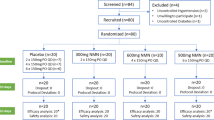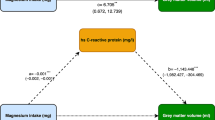Abstract
Objective
Metabolic syndrome (MetS) is characterized by the cluster of risk factors associated with diabetes and cardiovascular diseases. Given the influential role of oxidative stress (OxS) in the pathogenesis of MetS and the antioxidant properties of melatonin, our study aims to investigate the impact of melatonin supplementation on OxS biomarkers and serum endothelin-1 (ET-1) levels in patients diagnosed with MetS.
Methods
This double-blind, placebo-controlled, randomized clinical trial involved male and female adult participants with MetS. Subjects in the melatonin and control groups were administered 6 mg/day of encapsulated powdered melatonin or placebo (wheat flour), respectively, over a 12-week period. We evaluated serum levels of malondialdehyde (MDA), superoxide dismutase (SOD) activity, and ET-1 in MetS patients, both pre- and post-intervention.
Results
Melatonin supplementation significantly decreased serum ET-1 level (1.55 ± 0.24 pg/ml vs. 0.808 ± 0.18 pg/ml; p = 0.04) and MDA (1.326 ± 0.05 μM vs. 1.134 ± 0.05 μM; p = 0.021) in the melatonin group relative to baseline values. Additionally, SOD activity displayed a significant increase (23.64 ± 2.77 U/ml vs. 41.35 ± 1.22 U/ml; p = 0.0001) in the melatonin group when compared to baseline.
Conclusion
Our research indicates that 12 weeks of melatonin supplementation in MetS patients leads to a significant reduction in serum ET-1 and MDA levels, alongside an increase in SOD activity levels relative to baseline. However, further comprehensive and well-structured randomized controlled trials are essential for establishing the effects of melatonin supplementation on OxS biomarkers in diverse age demographics.

Similar content being viewed by others
Data availability
Upon request we can provide the data.
References
Fahed G, Aoun L, BouZerdan M, Allam S, BouZerdan M, Bouferraa Y, et al. Metabolic Syndrome: Updates on Pathophysiology and Management in 2021. Int J Mol Sci. 2022;23(2):786.
Cardinali DP, Vigo DE. Melatonin, mitochondria, and the metabolic syndrome. Cell Mol Life Sci. 2017;74(21):3941–54.
Amirkalali B, Fakhrzadeh H, Sharifi F, Kelishadi R, Zamani F, Asayesh H, et al. Prevalence of metabolic syndrome and its components in the Iranian adult population: a systematic review and meta-analysis. Iranian Red Crescent Med J. 2015;17(12):e24723.
Monserrat-Mesquida M, Quetglas-Llabrés M, Capó X, Bouzas C, Mateos D, Pons A, et al. Metabolic syndrome is associated with oxidative stress and proinflammatory state. Antioxidants. 2020;9(3):236.
Sánchez-Rodríguez MA, Martínez-Cruz M, Correa-Muñoz E, Mendoza-Núñez VM. Relationship between metabolic syndrome components and oxidative stress in elderly community-dwelling Mexicans. Ann Nutr Metab. 2010;56(4):302–7.
Tipoe GL, Leung T-M, Hung M-W, Fung M-L. Green tea polyphenols as an anti-oxidant and anti-inflammatory agent for cardiovascular protection. Cardiovasc Haematol Disord-Drug Targets. 2007;7(2):135–44.
Ighodaro O, Akinloye O. First line defence antioxidants-superoxide dismutase (SOD), catalase (CAT) and glutathione peroxidase (GPX): their fundamental role in the entire antioxidant defence grid. Alexandria J Med. 2018;54(4):287–93.
Ayala A, Muñoz MF, Argüelles S. Lipid peroxidation: production, metabolism, and signaling mechanisms of malondialdehyde and 4-hydroxy-2-nonenal. Oxid Med Cell Longev. 2014;2014: 360438.
Dziegielewska-Gesiak S. metabolic syndrome in an aging society - role of oxidant-antioxidant imbalance and inflammation markers in disentangling atherosclerosis. Clin Interv Aging. 2021;16:1057–70.
Monserrat-Mesquida M, Quetglas-Llabrés M, Capó X, Bouzas C, Mateos D, Pons A, et al. Metabolic syndrome is associated with oxidative stress and proinflammatory state. Antioxidants (Basel, Switzerland). 2020;9(3):236.
Chen X, Yan XR, Liu J, Zhang LP. Chaiqi decoction ameliorates vascular endothelial injury in metabolic syndrome by upregulating autophagy. Am J Transl Res. 2020;12(9):4902–22.
Campia U, Tesauro M, Di Daniele N, Cardillo C. The vascular endothelin system in obesity and type 2 diabetes: pathophysiology and therapeutic implications. Life Sci. 2014;118(2):149–55.
Schneider JG, Tilly N, Hierl T, Sommer U, Hamann A, Dugi K, et al. Elevated plasma endothelin-1 levels in diabetes mellitus. Am J Hypertens. 2002;15(11):967–72.
Yu AP, Tam BT, Yau WY, Chan KS, Yu SS, Chung TL, et al. Association of endothelin-1 and matrix metallopeptidase-9 with metabolic syndrome in middle-aged and older adults. Diabetol Metab Syndr. 2015;7:111.
Aboonabi A, Meyer RR, Singh I. The association between metabolic syndrome components and the development of atherosclerosis. J Hum Hypertens. 2019;33(12):844–55.
Xie S, Fan W, He H, Huang F. Role of melatonin in the regulation of pain. J Pain Res. 2020;13:331.
Wang YQ, Jiang YJ, Zou MS, Liu J, Zhao HQ, Wang YH. Antidepressant actions of melatonin and melatonin receptor agonist: focus on pathophysiology and treatment. Behav Brain Res. 2022;420: 113724.
Nduhirabandi F, du Toit EF, Lochner A. Melatonin and the metabolic syndrome: a tool for effective therapy in obesity-associated abnormalities? Acta Physiol (Oxf). 2012;205(2):209–23.
Ríos-Lugo MJ, Cano P, Jiménez-Ortega V, Fernández-Mateos MP, Scacchi PA, Cardinali DP, et al. Melatonin effect on plasma adiponectin, leptin, insulin, glucose, triglycerides and cholesterol in normal and high fat-fed rats. J Pineal Res. 2010;49(4):342–8.
Koziróg M, Poliwczak AR, Duchnowicz P, Koter-Michalak M, Sikora J, Broncel M. Melatonin treatment improves blood pressure, lipid profile, and parameters of oxidative stress in patients with metabolic syndrome. J Pineal Res. 2011;50(3):261–6.
Hacışevki A, Baba B. An overview of melatonin as an antioxidant molecule: a biochemical approach [Internet]. Melatonin - Molecular Biology, Clinical and Pharmaceutical Approaches. IntechOpen; 2018. Available from: https://doi.org/10.5772/intechopen.79421.
Zare Javid A, Hosseini SA, Gholinezhad H, Moradi L, Haghighi-Zadeh MH, Bazyar H. Antioxidant and anti-inflammatory properties of melatonin in patients with type 2 diabetes mellitus with periodontal disease under non-surgical periodontal therapy: a double-blind, placebo-controlled trial. Diabetes Metab Syndr Obes: Targets Ther. 2020;13:753–61.
Raygan F, Ostadmohammadi V, Bahmani F, Reiter RJ, Asemi Z. Melatonin administration lowers biomarkers of oxidative stress and cardio-metabolic risk in type 2 diabetic patients with coronary heart disease: a randomized, double-blind, placebo-controlled trial. Clin Nutr (Edinburgh, Scotland). 2019;38(1):191–6.
Szewczyk-Golec K, Rajewski P, Gackowski M, Mila-Kierzenkowska C, Wesołowski R, Sutkowy P, et al. Melatonin supplementation lowers oxidative stress and regulates adipokines in obese patients on a calorie-restricted diet. Oxid Med Cell Longev. 2017;2017:8494107.
Hu ZP, Fang XL, Fang N, Wang XB, Qian HY, Cao Z, et al. Melatonin ameliorates vascular endothelial dysfunction, inflammation, and atherosclerosis by suppressing the TLR4/NF-κB system in high-fat-fed rabbits. J Pineal Res. 2013;55(4):388–98.
Khonakdar Tarsi A, Ansari M, Ghazi Khansari M, Keramatipour M, Ebrahimi A, Emamgholipour S, et al. Melatonin inhibits endothelin-1 and induces endothelial nitric oxide synthase genes expression throughout hepatic ischemia/reperfusion in rats. Afr J Biotechnol. 2012;11(58):12222–8.
MesriAlamdari N, Mahdavi R, Roshanravan N, LotfiYaghin N, Ostadrahimi AR, Faramarzi E. A double-blind, placebo-controlled trial related to the effects of melatonin on oxidative stress and inflammatory parameters of obese women. Horm Metab Res. 2015;47(7):504–8.
Jiki Z, Lecour S, Nduhirabandi F. Cardiovascular benefits of dietary melatonin: a myth or a reality? Front Physiol. 2018;9:528.
Peschke E, Bach AG, Mühlbauer E. Parallel signaling pathways of melatonin in the pancreatic beta-cell. J Pineal Res. 2006;40(2):184–91.
Goyal A, Terry PD, Superak HM, Nell-Dybdahl CL, Chowdhury R, Phillips LS, et al. Melatonin supplementation to treat the metabolic syndrome: a randomized controlled trial. Diabetol Metab Syndr. 2014;6:124.
Chitimus DM, Popescu MR, Voiculescu SE, Panaitescu AM, Pavel B, Zagrean L, et al. Melatonin’s impact on antioxidative and anti-inflammatory reprogramming in homeostasis and disease. Biomolecules. 2020;10(9):1211.
Srinivasan V, Ohta Y, Espino J, Pariente JA, Rodriguez AB, Mohamed M, et al. Metabolic syndrome, its pathophysiology and the role of melatonin. Recent Pat Endocr Metab Immune Drug Discov. 2013;7(1):11–25.
Koziróg M, Poliwczak AR, Duchnowicz P, Koter-Michalak M, Sikora J, Broncel M. Melatonin treatment improves blood pressure, lipid profile, and parameters of oxidative stress in patients with metabolic syndrome. J Pineal Res. 2011;50(3):261–6.
Kedziora-Kornatowska K, Szewczyk-Golec K, Kozakiewicz M, Pawluk H, Czuczejko J, Kornatowski T, et al. Melatonin improves oxidative stress parameters measured in the blood of elderly type 2 diabetic patients. J Pineal Res. 2009;46(3):333–7.
Ostadmohammadi V, Soleimani A, Bahmani F, Aghadavod E, Ramezani R, Reiter RJ, et al. The effects of melatonin supplementation on parameters of mental health, glycemic control, markers of cardiometabolic risk, and oxidative stress in diabetic hemodialysis patients: a randomized, double-blind, placebo-controlled trial. J Ren Nutr. 2020;30(3):242–50.
Morvaridzadeh M, Sadeghi E, Agah S, Nachvak SM, Fazelian S, Moradi F, et al. Effect of melatonin supplementation on oxidative stress parameters: a systematic review and meta-analysis. Pharmacol Res. 2020;161: 105210.
Strycharz-Dudziak M, Kiełczykowska M, Drop B, Świątek Ł, Kliszczewska E, Musik I, et al. Total Antioxidant Status (TAS), Superoxide Dismutase (SOD), and Glutathione Peroxidase (GPx) in Oropharyngeal Cancer Associated with EBV Infection. Oxid Med Cell Longev. 2019;2019:1–15.
Yu A, Tam B, Yau W, Chan K, Yu S, Chung T, et al. Association of endothelin-1 and matrix metallopeptidase-9 with metabolic syndrome in middle-aged and older adults. Diabetol Metab Syndr. 2015;7(1):1–13.
Tao J, Lv J, Li W, Zhang P, Mao C, Xu Z. Exogenous melatonin reduced blood pressure in late-term ovine fetus via MT1/MT2 receptor pathways. Reprod Biol. 2016;16(3):212–7.
Wang Z, Ni L, Wang J, Lu C, Ren M, Han W, et al. The protective effect of melatonin on smoke-induced vascular injury in rats and humans: a randomized controlled trial. J Pineal Res. 2016;60(2):217–27.
León J, Casado J, Jiménez Ruiz SM, Zurita MS, González-Puga C, Rejón JD, et al. Melatonin reduces endothelin-1 expression and secretion in colon cancer cells through the inactivation of FoxO-1 and NF-κβ. J Pineal Res. 2014;56(4):415–26.
Mut-Salud N, Álvarez PJ, Garrido JM, Carrasco E, Aránega A, Rodríguez-Serrano F. Antioxidant intake and antitumor therapy: toward nutritional recommendations for optimal results. Oxid Med Cell Longev. 2016;2016:6719534.
Kurutas EB. The importance of antioxidants which play the role in cellular response against oxidative/nitrosative stress: current state. Nutr J. 2015;15(1):1–22.
Andersen LP, Gögenur I, Rosenberg J, Reiter RJ. The safety of melatonin in humans. Clin Drug Investig. 2016;36(3):169–75.
Funding
This study was financially supported by a grant No: HLRC-9612 from Ahvaz jundishapur University of Medical Sciences.
Author information
Authors and Affiliations
Contributions
Concept and Design: FS, RN-M.
Data Acquisition:SJ, ZN.
Data Analysis: SA.
Drafting the Manuscript: HG-Z, MHR, FS, RN-M.
Critical Revising of the Manuscript: HB-R, HG-Z.
Final Approval of the Manuscript: HB-R.
Corresponding author
Ethics declarations
Conflict of interest
The authors declare that they have no conflict of interest.
Ethical clearance
Subjects aged 18 and above who met the criteria of the National Diabetes Association for the diagnosis of metabolic syndrome were eligible to participate. Informed written consent was obtained from all study subjects.
Additional information
Publisher's Note
Springer Nature remains neutral with regard to jurisdictional claims in published maps and institutional affiliations.
Rights and permissions
Springer Nature or its licensor (e.g. a society or other partner) holds exclusive rights to this article under a publishing agreement with the author(s) or other rightsholder(s); author self-archiving of the accepted manuscript version of this article is solely governed by the terms of such publishing agreement and applicable law.
About this article
Cite this article
Ghaderi-Zefrehi, H., Seif, F., Niayesh‐Mehr, R. et al. Impact of the supplementation of melatonin on oxidative stress marker and serum endothelin-1 in patients with metabolic syndrome. Int J Diabetes Dev Ctries (2023). https://doi.org/10.1007/s13410-023-01266-5
Received:
Accepted:
Published:
DOI: https://doi.org/10.1007/s13410-023-01266-5




